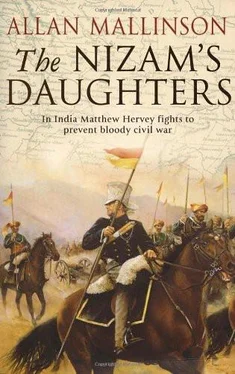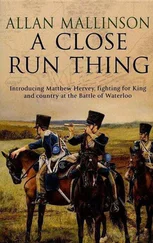Allan Mallinson - Nizams Daughters
Здесь есть возможность читать онлайн «Allan Mallinson - Nizams Daughters» весь текст электронной книги совершенно бесплатно (целиком полную версию без сокращений). В некоторых случаях можно слушать аудио, скачать через торрент в формате fb2 и присутствует краткое содержание. Год выпуска: 2000, ISBN: 2000, Издательство: Bantam, Жанр: Исторические приключения, на английском языке. Описание произведения, (предисловие) а так же отзывы посетителей доступны на портале библиотеки ЛибКат.
- Название:Nizams Daughters
- Автор:
- Издательство:Bantam
- Жанр:
- Год:2000
- ISBN:9780553507140
- Рейтинг книги:5 / 5. Голосов: 1
-
Избранное:Добавить в избранное
- Отзывы:
-
Ваша оценка:
- 100
- 1
- 2
- 3
- 4
- 5
Nizams Daughters: краткое содержание, описание и аннотация
Предлагаем к чтению аннотацию, описание, краткое содержание или предисловие (зависит от того, что написал сам автор книги «Nizams Daughters»). Если вы не нашли необходимую информацию о книге — напишите в комментариях, мы постараемся отыскать её.
Nizams Daughters — читать онлайн бесплатно полную книгу (весь текст) целиком
Ниже представлен текст книги, разбитый по страницам. Система сохранения места последней прочитанной страницы, позволяет с удобством читать онлайн бесплатно книгу «Nizams Daughters», без необходимости каждый раз заново искать на чём Вы остановились. Поставьте закладку, и сможете в любой момент перейти на страницу, на которой закончили чтение.
Интервал:
Закладка:
A frontal assault on any guns was, however, a calculated gamble, for there were bound to be casualties, especially close in when they began firing canister. It was, therefore, merely attrition — and a cynical attrition at that. Any cavalryman felt a deep repugnance towards confronting guns with nothing but the breasts of horses and brave men. And Hervey not least: he could not throw away the lives of any of his command in so premeditated a fashion. But the effort in this appreciation might not be wasted yet, for he saw clearly now that to disrupt the fire of the two guns on the Pindarees’ right was to open up an approach by which he could, perhaps, turn their flank.
Alter Fritz and his rissalah were doing sterling work drawing the guns’ fire — and, thereby, the Pindarees’ attention — to the right flank. The old quartermaster judged it prudent to advance no further except to send forward an open line of mounted skirmishers to try to draw the fire of the Pindaree cavalry mustered in a dense mass before the guns — by Hervey’s estimation, perhaps a thousand or more. And his stratagem was working, for all attention seemed fixed on the river flank. A calm settled once more on the kadir, as the gunners perceived their powder to be wasted at that extreme range, and all of Hervey’s force stood motionless in place. All, that is, but the two companies making their way on the left — still undetected — along the forest’s edge, and the mounted skirmishers advancing with deliberate slowness on the right.
It was now becoming uncomfortably hot: not yet the heat that seized the whole of the body in a vice, but fierce nevertheless, and salty beads of sweat were making their way down the back of Hervey’s neck. He took off his shako and wiped his forehead with his sleeve, and rubbed dry the leather cap-band. He envied the sepoys at the forest edge who, though their brisk step would not have been without effort, at least had some shade. He replaced his shako, adjusted the neckflap, though the sun would not bear directly on it for several hours yet, and took a long drink from his water bottle. He had been worried about water. He had been worried that the Pindarees might have poisoned the wells near where they supposed he would make camp. He had been relieved, therefore, to see villagers using them as they approached, and Alter Fritz, whose proud boast was never to have had a moment’s gripe since coming to Chintalpore, had pronounced the water sweet. But how he wished for Private Johnson’s chirrupy humour at this moment — that and the brew of tea he would have had at daybreak, and no doubt another canteen for him now. In Johnson’s mind a brew of tea was a kind of military elixir during whose making and drinking all priorities were resolved and all possibilities became apparent.
But with thoughts of Johnson came thoughts of Jessye, and a moisture about the eyes that was not the fault of the heat. He had always known that Jessye must one day succumb to… any number of things. Such was their precarious profession. But he had always promised her that the final blow would, if need be, come from him, and that she should pass peacefully with him by her side. And this promise he had not kept. Had he truly believed him when the subedar said she felt no pain lying there full of the snake’s poison? That letting her slip away with the sun on her back, rather than with the crack of a pistol in her ear, was a truer kindness? Or had he simply not the courage to see the oldest friend he had in the service lifeless at his feet? It was a cruel and ignoble end for her, and he had not been there at the final moment. Yes, Johnson had been with her, the man who loved her almost as much as he did. But Johnson had not seen her slip wondrously in that soapy membrane from between the haunches of her dam ten years or so before, nor watched her instinctive struggling for her mother’s milk only minutes later, nor her clambering to her feet and her first, tentative steps not long afterwards. These were what bound a man more closely to his horse than anything might — even if the man might find admitting it beyond him.
For the first time since coming to India he felt alone, though the rajah was close beside him. Every time he had awaited battle he had been surrounded by faces he knew and voices he recognized, and they had talked incessantly. There was always something to talk about: if it was not the battle to come it was the battle that had been. And then there was the encouragement of juniors by seniors, and the reassurance by return. But he did not know these native officers, and the impassivity of the sepoys and sowars unnerved him somewhat. He thought of riding up and down the ranks to hail them with an appropriate word, but his grasp of Urdu was still precarious, and he had none of Telugu, so the enterprise might be worse than unproductive.
Suddenly they were all attention to the right flank, where Alter Fritz’s skirmishers had opened a brisk, if scarcely effective, fire on the Pindaree cavalry.
‘What do they do there?’ asked the rajah, a little shakily.
Hervey reassured him. But contrary to everything he had expected — or, indeed, could have hoped — half the Pindaree host now surged forward in a trot towards the skirmishers.
The rajah became anxious. ‘They come upon us!’ he called.
‘No, sir, I believe they mean only to overawe the rissalah. Your cavalry’ (he was most particular in his choice of adjective) ‘do great service there, drawing the enemy’s attention. See over on the left how your sepoys make progress towards the guns unnoticed.’
The rajah was further reassured.
But Hervey was surprised when he saw that the sowar-skirmishers did not turn about to rejoin the rissalah, but stood their ground and fired further volleys at close range — this time with lethal effect. It was, he told the rajah, as steady a conduct by cavalry as he had seen. And then, when another few seconds’ delay would have seen them overrun, they turned for safety and galloped back to where Alter Fritz and the rest of his men stood.
Again, he expected that the Pindarees would not press their advance — certainly not beyond supporting range of the guns. But they did — perhaps five hundred of them. What, indeed, could they fear? Alter Fritz’s one hundred could not withstand them, for sure. Would he charge them, as was the practice? The seconds passed, the rajah growing more anxious with each (and, indeed, Hervey too — though not as conspicuously). Another ten might spell disaster. Then Alter Fritz’s front rank fired their carbines, turned about and retired at a steady trot, leaving the second rank to send their volley into the mass of horsemen. The effect was not, perhaps, as devastating as the smoke and noise portended, but a good many men and horses were tumbled nevertheless.
Still the Pindarees did not check. If anything they increased their pace. The rissalah was now in a gallop — and in the highly irregular order of two columns. Hervey was full of admiration for their drill, if perplexed by the formation. Until, that is, he saw that the columns were making for the two clear paths through the fougasses. ‘Great heavens!’ he exclaimed, alarming the rajah even more.
‘What is it, Captain Hervey?’
‘Your Highness, you will see in a short while. I believe that the Pindarees are about to receive a very great shock. They are about to have a taste of what is sometimes known as — if you will excuse my saying so — “poor man’s artillery”!’
The rissalah columns wheeled left and right into line, fronting fifty yards to the rear of the fougasses, the galloper guns unhitching and making ready before even the last of the lancers had taken post. Alter Fritz galloped along the line shouting orders to the NCOs who had been lying concealed with their slow matches at the end of each powder trail. Before he reached the flank they fired the first of the fougasses, followed immediately by another, and then more. The ground heaved, great fountains of earth spouted high, and those rocks which had not been projected forward rained down on the Pindaree rear ranks. Horses and men tumbled in their dozens as shot, nails and pebbles swept like a scythe into the packed lines. Hervey counted fourteen or fifteen explosions. No more than five or six must have misfired — not a bad rate of success.
Читать дальшеИнтервал:
Закладка:
Похожие книги на «Nizams Daughters»
Представляем Вашему вниманию похожие книги на «Nizams Daughters» списком для выбора. Мы отобрали схожую по названию и смыслу литературу в надежде предоставить читателям больше вариантов отыскать новые, интересные, ещё непрочитанные произведения.
Обсуждение, отзывы о книге «Nizams Daughters» и просто собственные мнения читателей. Оставьте ваши комментарии, напишите, что Вы думаете о произведении, его смысле или главных героях. Укажите что конкретно понравилось, а что нет, и почему Вы так считаете.











